There are a lot of WordPress Search Engine Optimization (SEO) plugins, but only a few of them grab the spotlight. Yoast SEO, for example, is the name that comes to most people’s minds, but it’s far from the only solid tool in this plugin category. There are plenty of other excellent plugins to choose from. One name that’s been making a lot of noise lately is The SEO Framework. In this article, we’re going to talk about some of the reasons why you might want to look for an alternative SEO plugin. We’ll then introduce you to our pick for today and talk about how it compares to other plugins in the same category.
Let’s check it out!
Why You Might Want to Look for a Yoast SEO Alternative

Yoast SEO is an excellent plugin, but it’s not your only option.
First off – let’s preface this section by saying we think Yoast SEO is an excellent plugin. It does its job well, and the way it enables you to check out your keyword usage and your posts’ readability is excellent. However, no single plugin is perfect, and it’s always a good idea to check out if there are alternatives that can better serve your website.
Plugins like Yoast SEO shine due to the sheer number of settings they provide you. However, having too many configuration options can sometimes be a hassle for beginners, or those looking for a simple solution. In other words, if you care about SEO but you’d like to use a less overwhelming plugin, you should look into the alternatives. We’ve previously talked about All in One SEO Pack, which is also an excellent tool.
For this article, we’re going to focus on a newer solution many seem to like – The SEO Framework.
An Introduction to The SEO Framework

The SEO Framework is an extendable plugin with a goal of helping your content rank better in search engines. It offers many of the familiar features you’d expect from other SEO plugins. For example, it enables you to set custom titles and meta descriptions for your content, and provides you with an overview of where your content is lacking when it comes to SEO.
However, one of the most unique aspects of The SEO Framework is its extendability. You can set up a companion plugin called Extension Manager, which helps you implement additional functionality to the parent tool. Some of them include options to help you focus on specific keywords, set up local business information, and much more.
More importantly, the plugin emphasizes simplicity. It’s a good option for people with little SEO experience and easy to pick up, but it also includes enough options to let you dive deeper. Overall, it feels like a very mature plugin – no wonder it’s become popular in recent times.
Key Features:
- Provides suggestions on how to tackle your SEO efforts.
- Offers highly configurable settings.
- Lets you customize the title, meta description, and Open Graph settings for the content you’d like.
- Provides advice on which areas of your SEO need more work.
- Works with custom post types.
Price: The plugin is free, but some extensions are paid | More Information
How The SEO Framework Compares to Other Similar Plugins
In this section, we’re going to talk about ease of use and included features. Let’s start by taking a look at the settings The SEO Framework offers you. Once you enable the plugin, you’ll get access to a new SEO tab on your dashboard, which will initially take you to the plugin’s settings screen:
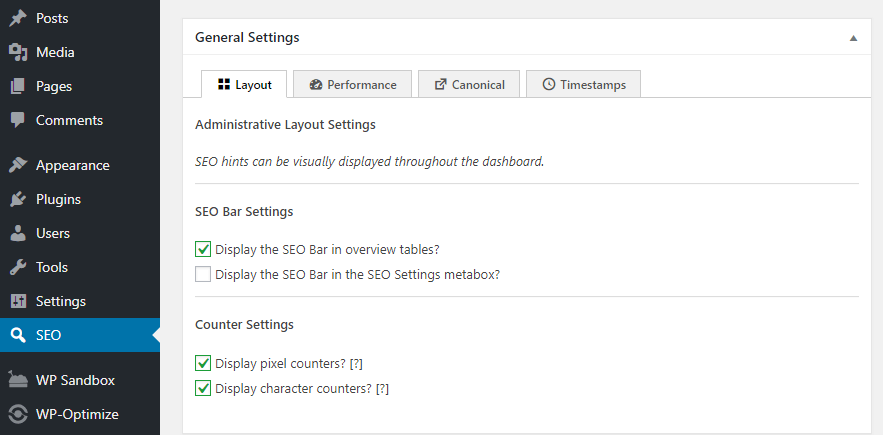
You’re probably familiar with most of these settings. The SEO Framework enables you to tweak your content’s layout, title settings, meta description and social media options, and even how Schema markup is used:
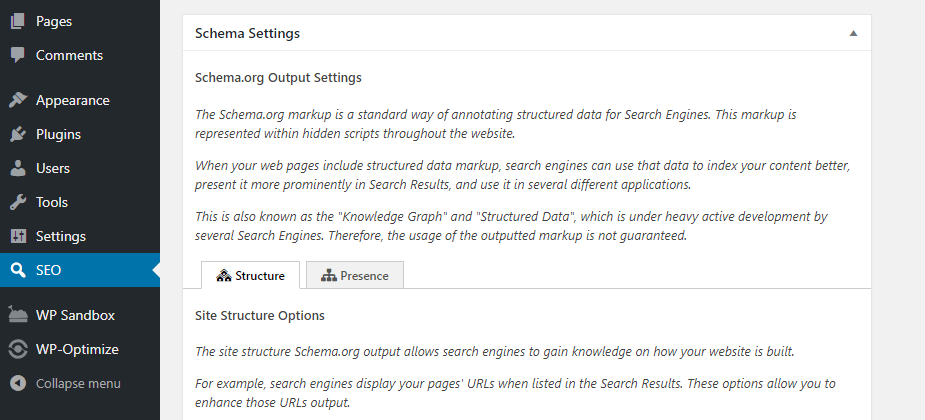
As far as ease of use goes, the plugin does an excellent job of explaining what each feature does. More importantly, the default configuration is good enough to leave alone for the most part. However, there’s more than one page of settings to cover. One of the things that drew our attention to The SEO Framework in the first place were claims it provided better performance than Yoast SEO. As such, the plugin includes a few settings dedicated to improving performance:
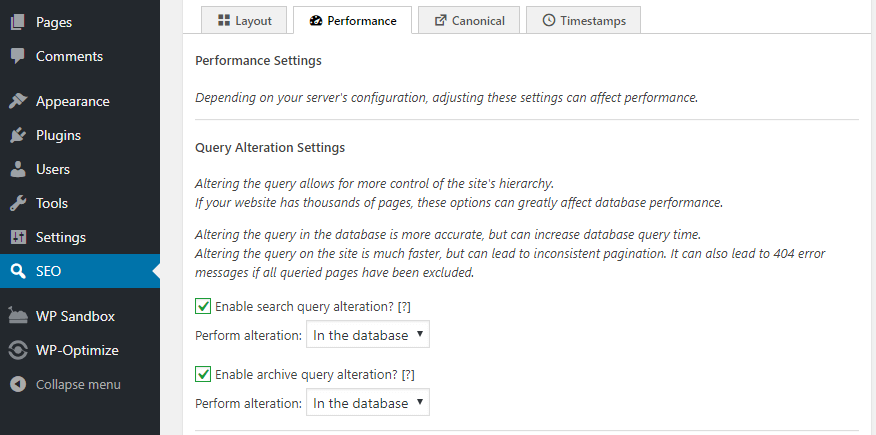
It’s a nice touch, although the plugin warns you probably won’t see a big difference in most cases. In our own experience, we can say the plugin does feel less sluggish than Yoast SEO, but your mileage may vary. Overall, we can say the plugin is competitive with other SEO plugins such as Yoast and All In One SEO Pack when it comes to configuration options.
Moving on, let’s check out how the plugin tackles on-page SEO. Let’s start by taking a look at your All Posts tab. You’ll notice there’s now an additional SEO column, which includes color-coded scores for different aspects of each post’s SEO:

As you might expect, green stands for good and red for bad. The above example has several aspects we can improve on, and we know what they are via tooltips, which is a neat feature. When we next go into the content editor, you’ll see a new Post SEO Settings metabox at the bottom of the screen:

Unlike Yoast SEO, this section doesn’t include keyword optimization options or readability scores. However, it does offer options to change your post title and meta descriptions, and social media settings:

There are also options to change your robot.txt settings for each post or page, or set up custom redirect URLs:
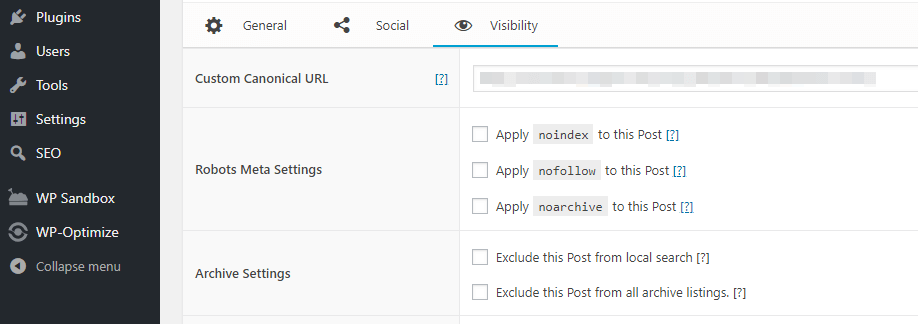
The main turnoff here is the lack of keyword information. This feature within Yoast SEO can be incredibly helpful if you like visual aids. However, if you’re confident in the way you use keywords, it may be superfluous to your requirements. You can add similar features using The SEO Framework’s Focus extension. However, some people might prefer if it were included out of the box.
Overall, we can say confidently The SEO Framework provides an experience that’s comparable in polish to Yoast SEO. It doesn’t take as much of a toll on your site’s performance either. This alone could make it a better option for small websites with less of an SEO concern.
When it comes to features though, Yoast SEO is still king. However, it’s a close call. The extendability of The SEO Framework will also appeal to those who like module-based systems. In short, if you’re in the market for a new SEO plugin, this one definitely deserves your attention.
Conclusion
One of our favorite things about WordPress is the high number of options you have when it comes to plugins, regardless of what functionality you want to add to your website, including SEO. Despite the fact a few plugins take most of the spotlight, there are some noteworthy up and comers to be aware of.
Overall, The SEO Framework provides an excellent experience. It offers a wealth of features and is easy to use. We’d say it’s pretty close to catching up to Yoast SEO as far as features go, despite some out of the box omissions. If you’re looking for a new solution, this one is well worth considering.
Do you have any questions about which SEO plugin you should use on your website? Let’s talk about them in the comments section below!
Article image thumbnail by theromb / shutterstock.com.








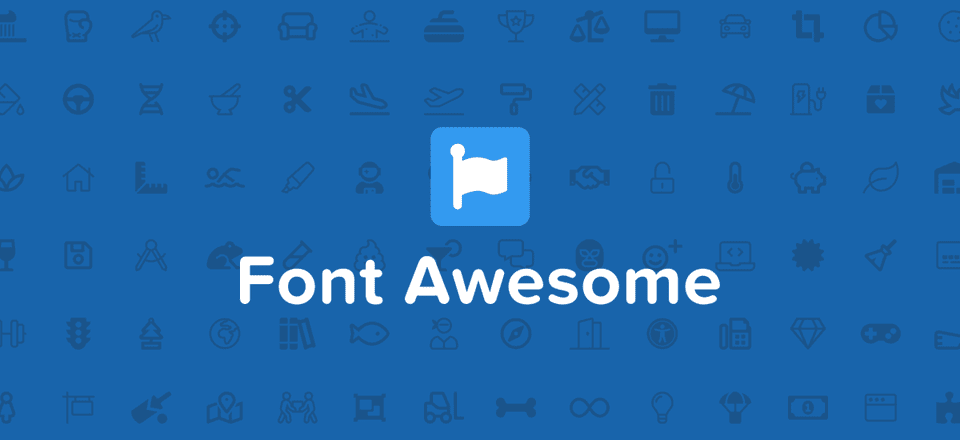
Excellent alternative. We are a SEO agency and we think this kind of plugins worth the money.
Not great alternative, I see the topic of my posts like this:
T
H
E
B
O
O
K
Interesting article. I’ve had issues with the Yoast plugin and Divi recently as well as many others. I’d like to try SEO Framework, but want to know other than doing a backup is there information on transitioning from Yoast to SEO framework? Or do I just install the plugin and activate it?
Thanks
Hi Judy,
You might find this article useful: https://theseoframework.com/docs/seo-data-migration/
If you have any further questions about SEO Framework, you might also want to reach out to the developers: https://theseoframework.com/contact/
I hope you find the plugin useful. 🙂
This was very useful. (I too think Yoast is a resource hog and it’s fairly well documented). Trying out SEO Framework and so far I like it.
Thanks!
You’re very welcome, Tess! 🙂
We too are running on The SEO framwork! Good experience so far and I actually think it’s more friendly than yoast. I’m an SEO guy myself, but wouldn’t switch this to yoast anytime soon. (Although I also have so many sites running Yoast!)
After reading this article, I shifted from Yoast to The SEO Framework and I really liked it. Thanks!
You’re welcome, Jacob! 🙂
Thanks, John, for the blog post. I’m also an SEO Framework user, and have found it easier to use and just as effective as Yoast. I’m a fan of both, but SEO Framework is my first choice on CalHomeNews and a few other projects. I always enjoy the Elegant Themes blog posts.
You’re welcome, Ron, I’m glad you’re enjoying the blog!
What about redirections? Yoast premium has a redirection handler, so switching plugins would likely mean losing those redirects. And then what is recommended to handle automatic redirect detection and management??
Hi, Arby. 🙂 Unfortunately, I am not sure how this would work as I haven’t tried it myself. I suggest that you contact the developers for more information: https://theseoframework.com/contact/
Great article. Many Thanks.
In case I would like to leave Yoast and install THE SEO Framework, is there anything to take into consideration? What about all the settings (e. g. alternative URLs) I made within Yoast in the different articles? Will I leave them? Or is there a way to move them to the new plugin?
You’re quite welcome, Derek! 🙂
There is some information about migrating SEO data available in the official documentation that you may find useful: https://theseoframework.com/docs/seo-data-migration/
I installed the plugin on a new site. Thank you for the direction.
But not being very savvy, I see a “red DG” For some reason when I hover over no description shows up.
What does the “D” Stand for and what should I do?
Thank you
You’re welcome, Chuck. I’m glad you found it useful. 🙂
“DG” stands for “Description Generated” and refers to your meta description. There is more information available in the official documentation: https://theseoframework.com/docs/
The generated description is red specifically with the Divi editor because a description cannot be auto-generated due to the page builder. Is there any way to work around this?
As everyone else, Yoast was my SEO plugin of choice for years, but since I a few years ago gave The SEO Framework a spin, I switched all my 30+ sites the SEO Framework, and I’m *very* happy with the results and SERP’s.
To me, the simplicity and intelligent default settings are important. I can configure The SEO framework to my preference in matters of minutes, and it just does it job.
During the years I’ve been using it – mostly with Divi and Extra actually, I haven’t *once* had any issues after updating plugin or theme.
Support for Custom Post Types is out of the box, and for more odd use cases there are a bunch of filters available and well documented.
The Extension Manager is a clever approach. The main plugin covers all the basics for the typicial site with minimum performance overhead. Additional features are optional, both free and premium.
… oh, and Sybre, the developer has a deep and up to date knowledge about SEO.
Both Yoast and The SEO Framework are excellent products, so choosing is really a matter of taste, habits and use cases. But I suggest the WordPress builders take The SEO Framework for a test drive, you might be in for a pleasant surprise.
nice post
Thank you, Shane 🙂
Have been using SEO Framework for ages – can get a brand new local site onto page one almost immediately – depends on competition of course – but it works and is really easy to use.
Hello guys! This plugin is excellent. I use it on my sites and it fulfills very well the promised.
Another thing, the developer is very active, always answers our questions, even for user who use the free version.
Yoast is a great plugin without any doubt, but after the last bug in version 7.0… The SEO Framework is a good alternative, but what do you think about SEOPress?
I personally haven’t had the chance to use SEOPress, but it seems several other commenters have had positive experiences with the plugin. 🙂
Please try to review SEOPress.
I have it installed on my blog and its very easy to use so far.
Maybe Yoast should try using The SEO Framework on his own site — [Error 404: Page not found](https://drive.google.com/a/qloudpress.com/file/d/1ZE5dmAWBm-0G0vo8u4GUopEKLMm7dxjM/view?usp=drivesdk)
Hi John, Looks like a promising plugin. Thanks for sharing! Its worth checking it, if its lighter than Yoast.
You’re welcome, Ananda! 🙂
WOW. Thank you for this. I had no idea what drag Yoast put on my system. Switching really sped things up!
You’re welcome, Chris. I’m glad it was helpful! 🙂
I stopped using Yoast several years ago. Too bloated and buggy. Often, the sitemap wouldn’t work unless I disabled and then re-enabled it. Plus, there were too many nag screens and false alarms, the latter causing clients to panic and keep contacting me.
I know they’ve tried to clean it up lately, but I prefer All in One SEO, which has always been less cluttered and easier to use.
So, I don’t care whether Divi works with Yoast. I’d rather use something simpler for SEO anyway. But I can understand the ire of those who purchased a premium Yoast license.
I can’t remember the last time I’ve used yoast in any of my websites. It has been years. I’ve read somewhere Yoast slows down your site. I’ve stuck to one SEO plugin for years now and never looked at anything else…I was also a Thesis Theme Framework user for years which has built-in SEO features. Man I missed using that theme! It’s so much faster than Divi lol.
SEOPress, is by far my favorite SEO plugin. I recommend investing in the paid version which is very cheap and the best part is its White Labeled and has all the tools you will ever need.
Just starting with Divi. I plan on advertising the use of Yoast SEO in my advertising business. If it won’t work I need to change my plans. Can Yoast be stable with Divi? Should I change my plan?
Are you trying to promote other plugins because of Divi and Extra compatibility problems with Yoast? I`m an Extra theme user and I just stopped using both Visual Builder and Divi Builder due to the issues I had. I was spending more time submitting tickets than building my site. Great theme but in my opinion over-engineered. If I like to use the Divi Builder I will have to remove all the plugins due to the compatibility issues.
I started with Yoast then moved over to SEO Framework. Never had a problem with it and Extra. Support is great. And it also has some nice extensions.
That sounds great, Marty. I’m happy it’s working out for you.
This is a real bad article that seems to be written for the sole purpose to get visitors who are searching for ‘Yoast SEO performance’ or something similar.
You claim four times in different wording that Yoast is bad for performance:
– such as occasionally slowing your website down.
– one of the plugins that can impact your loading times the most
– can be a bit of a resource hog
– claims it provided better performance than Yoast SEO
And yet you don’t provide any comparison or proof for these claims. You do refer to an other article about ‘WordPress plugin performance’ but ‘The SEO Framework’ was not part of that comparison.
I’m sorry you didn’t enjoy the article. The point of this article was not to suggest that Yoast is bad for performance, as it’s actually a superb plugin. However, the intent was to provide an alternative for users that may be affected by issues with Yoast.
Thank you for the reply John.
I appreciate the intent to provide an alternative and I do like to read them because I might learn something new.
However, with just that intent I don’t think there is need to mention 4 times in different wording that Yoast has bad performance. Doing so really looks like an SEO tactic and gives a pretty strong suggestion that Yoast is bad (especially when there is no proof provided).
I stopped using Yoast’s SEO plugin a couple of years back. My concern has nothing to do with the current problems, and everything to do with Yoast’s attitude to quality control and resolving issues even if you’re not a Premium customer.
I showed him the specific, documented proof as to why his plugin was causing 78% of what was slowing my sites down, and he just told me something along the lines of “what do you expect?” and “the plugin trying to do so much”, and finally, “Godaddy’s plugin is crap”.
Then finally, a few months later when an update of Yoast’s SEO plugin took out 16 of my clients’ sites, I called a halt and started using only SEO Framework. I haven’t had a single problem since then.
I can tell you ~ and I have all the proof you can eat, and if you’d like me to send it to you I will ~ the speed and memory usage performance of The SEO Framework is second to none (literally), plus the SEO benefits are real, and the plugin is not bloated with adverts for premium products and services, or bells and whistle which do nothing except slow your site down.
Plus, whenever I have had a question, the author of SEO Framework has always been super helpful, friendly and knowledgeable. What a pleasant change from trying to get a straight answer out of Yoastie boy!
i moved from yoast a while back, starting using seo pressor, i find it far more intuitive and i have got better-ranking results as a result of the switch.
Think its $11 per month.
Thanks for the suggestion, Steven. 🙂
Same. Pressor is the way to go. The addition of Dublin Core is icing on the cake. It’s $9 per month.
Seo framework is the reflect on what I’m doing on network therefore I ask you to fix my website of any SEO efficient components in view to boost this SEO framework how important for my website life.
Thanks, I might try that on one of my sites ! I currently use Yoast and have seen some improvements in traffic since I started using it but I want more… Here’s hoping !
You’re welcome!
“it’s important to note Yoast SEO can be a bit of a resource hog”
That’s why I changed over to the SEO Framework plugin on all my sites about six months ago. I wasn’t using most of what Yoast offers anyway, and SEO Framework does what I need – and is MUCH more light-weight.
Thanks for sharing your experience and I’m glad the change has been positive. 🙂
Did all the data from Yoast port over when you switched plugins?
THAT is a great question!
Interesting, I just switched from All in One SEO to Yoast and found the site performance improved when tested with Pingdom.
I’be been experiencing load time issues when testing with Google’s Mobile 3G test site since I started using a SSL certificate.
Where I was once getting a 5 second Good score I now get an 11 Poor score and if I am lucky on some days it says 6 or 7 secondsFair. Pingdom now gives me an overall 98% score.
I will do some further testing by deactivating other plugins.
Is this plugin still faster than Yoast after you install the extension manager plugin and then I am assuming another plugin to do XYZ?
So 3 plugins now..
?
Moved away from Yoast a couple of years back, and have been a user of this plugin since the early days. It’s an excellent alternative, gets great results, is much more user-friendly, and the support is great, too.
Highly recommended.
Thank you for sharing your insights. 🙂
Did you do any before and after speed testing? I’m curious what the difference is.
I’m relatively new to divi, yoast and Seo Framework, (which I feel was a major upgrade to Yoast’s pitifully, doggy performance on my older, dual core PC.) In fact, Yoast ran so slowly, my PC was virtually unusable. No such problems with SEO Framework and I actually prefer the interface and options of SEO framework. I had to completelly redesign a 20+ page site and move it to a new host, going from a IIS, .aspx to divi on wordpress. The built in redirects were a huge bonus too. Wondering if anyone has purchased the add-on for local services and how effective that option is.
How about you make it a priority to afford Yoast functionality in Divi (it’s not played nice ever), which you’ve conveniently not mentioned here.
Elegant/Divi Customer
What do you mean by “afford” ??
Surprise, they won’t look into bugs when you do have a pro version either? I left Yoast ages ago and have been running this for about a year.
And what are your experiences with this plugin?
Thanks, John, great timing. The other day, I was having an issue with images in the code that weren’t on the page, it seemed Yoast was having an issue my Divi install.
This looks like a great SEO plugin to try next.
You’re very welcome! 🙂
How about you make it a priority to afford Yoast functionality in Divi (it’s not played nice ever), which you’ve conveniently not mentioned here.
Elegant/Divi Customer
Agreed. I would REALLY love to have a way to add breadcrumbs across the entire site without having to add a code module to each page/post.
This couldn’t have come at a better time since Yoast decided they wont investigate a bug without me buying a premium subscription.
Moving over 100 websites from Yoast due to their recent debacle. Might want to checkout SEO Press too.
Thanks. I’ll check SEO Press too. I’m having to move lots of sites too…
Its funny this post comes when users (myself included) are getting compatablity issues between divi and yoast. Why cant this issues juts be fixed. Some of us have purchased a Yoast licence and now we cant use it with DIVI.
That`s exactly what I was thinking. I had such problems that eventually I have stopped using Divi Builder. Great words Azu!
What kind of compatibility issue? I use Divi and Yoast (free) on all my sites and I don’t see big compatibility issue anymore.
Having said that, there are Yoast features that don’t work well with Divi because Divi replaces the standard WordPress editor.
For example, the Yoast readability feature does work, but it can’t show markers for problem area’s. There used to be issues where the link count feature did not work and the image sitemap was empty because Yoast uses html formatting while Divi uses shortcodes, but that seems to be fixed by the Divi team.
You can’t expect Yoast to add code to work with every page builder out there. In stead, they have filters that theme developers can use to integrate.
I also have compatibility issues since 2 releases ago. Only the Readability tab is available. The focus keyword section has disappeared. Time to change.
I’ve also had major issues since the recent WP and Yoast updates. I am now unable to use the Yoast editing section for meta data because as soon as I enter the cursor into the editing space, the Divi builder pops up and asks me to do a split test.
I have tried copying and pasting the data from a txt document but even this won’t work. Also tried disabling other plugins.
Seems to be Yoast.
SEO Framework is looking good. 😉
I use Yoast SEO as well – both free and paid. A workaround for the Yoast readability feature is to use the standard WordPress editor when writing content. Once the content is finished, switch over to Divi builder. Yes, it can be a lengthier process, but at least you can still receive the benefits of the readability feature. Hopefully Divi and Yoast can find a way to get all features to play nicely with each other in the future.
Excellent suggestion Kristof. I’m so happy that you suggested working around the readability problem using WP editor first, allow Yoast to do its thing, and then switch the corrected product over to Divi. Brilliant. Thank you. Will do.
This post isn’t an attempt by us to get people to jump ship from Yoast, but simply to cover another option available to WordPress users. As both Divi and Yoast are two major WordPress products often used together, I’m confident any conflicts will be resolved. I know our devs have open channels of communication for easier collaboration on issues like this that may crop up from time to time.